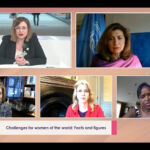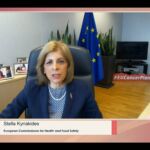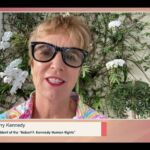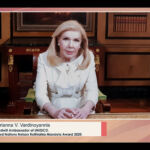“WOMEN IN THE AGE OF THE PANDEMIC”
Athens, 9 March 2021
The voices and forces of great women from all over the world, were united by the Marianna V. Vardinoyannis Foundation, in order to send a strong message about the need for more and true equality, in the context of the International Online Discussion “Women in the Age of Pandemic” which took place on Monday, March 8th, 2021, on the occasion of the International Women’s Day.
On the initiative of the Goodwill Ambassador of UNESCO Mrs. Marianna V. Vardinoyannis and with the honorable participation of H.E. the President of the Hellenic Republic Ms Katerina Sakellaropoulou, 20 women from all over the world, with important work in international organizations and decision-making centers, in science, social welfare, politics and media, exchanged experiences and views on the important role women can and should play in the difficult times we live in, as well as for the great challenges of the pandemic.
INTRODUCTION / GREETINGS
At the beginning of the Discussion, Mrs. Vardinoyannis spoke in detail about the dramatic effects of the pandemic on the lives of women worldwide, who have been disproportionately affected by poverty, unemployment, wage cuts, extra responsibilities of caring for young children and the elderly, and increasing domestic violence while they significantly burden their mental health. Through her speech, she also sent a touching message of empowerment and inspiration for the unique abilities of women who have kept and still keeping our societies united in the dark period of the pandemic.
Mrs. Vardinoyannis mentioned in her speech: “As an UNESCO Goodwill Ambassador and member of the United Nations family for more than 20 years, I am absolutely convinced that, in times of crisis, the virtues that are the only path to fairer and better choices are solidarity, compassion and generosity. We believe that, in this difficult time more than ever, women who manage to keep their families together are capable of keeping our societies also united. Wherever they come from, all women “speak the same language” and share a common vision: The vision of a world of peace, justice and equality. A better world for their children to live in!”
H.E. the President of the Hellenic Republic Ms Katerina Sakellaropoulou talked about the horrific consequences of the pandemic on the lives of women, mentioning that: “In conditions of crisis such as the one we are experiencing today, gender inequalities are reproduced and deepened. Life choices for girls and women are decreasing rapidly. And unfortunately the gap between the sexes, the loneliness even within a relationship becomes more noticeable. Domestic violence escalated tremendously during the pandemic, social tension and change in our daily lives, financial insecurity, feelings of inadequacy and helplessness brought conflicts within homes, verbal violence, mental and physical abuse…. I do not know what wounds the pandemic will leave behind in the souls of women”.
The First Lady of Cyprus, Mrs. Andri Anastasiadis, spoke about the need for immediate implementation of policies in the direction of gender equality: “The effort to achieve gender equality is a struggle that does not stop. The benefits of direct implementation of policies and actions by governments and decision-making centers on gender equality, even in the pandemic era, will be significant for any country, as women play a crucial role in the development of economies. But women can play a crucial role in pandemic recovery efforts, and that is why we need to take important steps to ensure that women have the power to participate in this effort.”
The wife of the Greek Prime Minister, Mrs. Mareva Grabowski – Mitsotakis, spoke about the important role that women had during the pandemic, while making a special reference about the MeToo movement: “In recent months, at least in our country, there is a ray of hope that we can break the cycle of fear and silence. Sofia Bekatorou’s courageous decision to speak has allowed countless other women to share their experiences, talk about what happened to them and help us all send a strong message against all forms of abuse and violence against women. It has no place in our society. With every woman who dares to speak, we raise a wall of defense against violence and abuse,supporting every woman who dreams of a better future”.
The President of the “Robert F. Kennedy Human Rights” Center, Ms. Kerry Kennedy, congratulated Mrs. Vardinoyannis on her initiative, emphasizing her great contribution in every field of public life, describing it as “an inspiration for every woman”. At the same time, Ms. Kennedy in her speech stressed the importance of women fighting for equality: “Strength comes when we are united. As women we must fight, supporting each other and calling for a definitive end to our treatment as a lower sex… Activism can take place at any age, in any part of the world. As they say “strong women empower women”.
The Opening was moderated by Mrs. Mara Zaharea, journalist.
FIRST SESSION. THE CHALLENGES FOR WOMEN AROUND THE WORLD: FACTS AND NUMBERS
The First Session of the Discussion was dedicated to the challenges that women are facing worldwide,with the participation of leading female personalities from around the world.
The Commissioner for Health and Food Safety of the European Commission, Mrs. Stella Kyriakidou, made a special reference to the need for equal access to health care for women in Europe, describing the pandemic period as an “opportunity” to correct inequalities and injustices. Mrs. Kyriakidou mentioned:”Today we honor all the women who, as mothers, partners, daughters, sisters, manage to stand out in the great challenges of this pandemic and show us the way forward.”
UNESCO Deputy Director-General for Social and Humanitarian Affairs Ms Gabriella Ramos noted the risk posed by the pandemic in achieving equality: “The pandemic crisis is jeopardizing the progress we have made in many areas of gender equality”. She also spoke about the important UNESCO initiatives for the elimination of discrimination, stereotypes and prejudices.
The Dutch Deputy Minister of Finance, Ms Mona Keijzer, spoke about women’s entrepreneurship and the challenges women face: “Women entrepreneurs face difficulties in accessing capital, compared to men. And it is not always entirely clear why. Sometimes it is a matter of self-confidence, sometimes it is a matter of experience and sometimes the reason is prejudice and we have to eliminate it… To create a world of equal opportunities for women entrepreneurs, not only in theory but also in practice”.
Greek Permanent Delegate to the United Nations, Ambassador Maria Theofili presented the work of the “UN Women” in managing the effects of the pandemic on women’s lives, and spoke about Greece’s role in the UN, in decision-making on gender equality: “Greece is present in all efforts of the United Nations aimed at highlighting the role of women in the pandemic. We are actively involved in the adoption of important decisions that will result in the commitment of the Member States, the United Nations bodies and civil society to address the effects of the pandemic on women and young girls around the world and to promote measures in favor of equality”.
Ophthalmologist and Nelson Rolihlahla Mandela Award Laureate 2015 Dr. Helena Ndume presented with great emotion the enormous difficulties faced by women in Namibia due to the pandemic such as poverty, unemployment, violence and abuse. Dr Ndume stressed that “the pandemic has taught us a lot about how we used to live as a society. What the pandemic did was to shake off the ignorance we wanted to have about these issues. The model where women are excluded from economic, social and health care cannot be continued and we must now put an end to it. Women are the backbone of Namibian society. Empowering and protecting them is the key to the progress of any developing country”.
The First Section of the Online Discussion was moderated by MEP Mrs Maria Spyraki who spoke in detail about the effects of the pandemic on the lives of women in Europe and stressed the important role of female leading personalities in managing the pandemic at European level.
KEYNOTE SPEECH: THE WORK OF THE UNITED NATIONS BODIES ON HUMAN RIGHTS PROTECTING WOMEN’S RIGHTS
Keynote speaker of the event was the newly elected Chair of the UN Commission on Human Rights, Professor Fotini Pazartzi, who presented in detail the effects of the pandemic on women’s lives, and spoke about the important work of the United Nations for the elimination of all forms of discrimination against women. Mrs. Pazartzi said:”There is always room for improvement and change. For me, we can defend women’s rights more effectively with two basic principles in mind: First, the universality of human rights, on a global scale, and equal opportunities. Secondly, the fact that human rights are indivisible. Through any social differences, gender differences or other, beyond any discrimination, with the realization that all rights, whether social, political, economic or cultural, are all interconnected”.
SECOND SESSION. WOMEN AND PANDEMIC: THE EXAMPLE OF GREECE
The Second Session of the Online Discussion was dedicated to the example of Greece and the consequences in the lives of Greek women, with the participation of distinguished women in the fields of politics, business, social solidarity and science.
Deputy Minister of Welfare and Social Solidarity, Mrs. Domna Michailidou spoke about the need for policies to address the consequences of the pandemic on women at social and economic level: “Women have been disproportionately affected by the pandemic, which has exacerbated pre-existing inequalities in society and the labor market, created new challenges and jeopardized recent achievements. Therefore, while the main goal should be, and is, to address the negative economic consequences, governments around the world should also plan and implement policies to strengthen the economic position of women not only in the pandemic era, but and after it”.
Deputy Minister of Labor, responsible for demographic policy and family, Mrs. Maria Syregela, pointed out that discrimination against women is not due to the lack of legal framework, but to the reduced effectiveness of its implementation, not only due to deep-rooted stereotypes of Greek society but due to the fewer opportunities given to women.
The Head of the Women in Business Committee of the Hellenic-American Chamber, Mrs. Mylaidi Stoubou, presented the research of the Hellenic-American Chamber on the effects of the pandemic on the lives of women in Greece, which shows that women have been disproportionately affected at every level. She stressed, however, that the crisis can be an opportunity to create a different work model that will strengthen the role of women and will be based on the use of new technologies, the ability to work remotely from home but also to create a more humane model of leadership in business in which women can play an important role. “Women must be at the center of the planning of the next day for Greece. This is important for each of us, for our daughters, for our future”.
Dr. Anastasia Kotanidou, Professor of Pulmonology-Intensive Care at the Medical School of the National & Kapodistrian University of Athens, spoke about the challenges and difficulties women are facing in their workplace: “According to a recent survey, the majority of women (67%) have experienced gender discrimination in their workplace. According to the survey data, 4 out of 10 women answered that they have often been asked, during an interview, to answer a question about their marital status, while 7 out of 10 have been in this position at least sometimes”. She stressed the need to give them equal opportunities saying: “We look at all people with their skills, the way they have grown up professionally and we offer equal opportunities to everyone regardless of gender, age, nationality and other discrimination. A society cannot progressif women remain uneducated.”
The Vice President of the “ELPIDA-Association of Friends of Children with cancer”, Mrs. Marianna Lemos, stressed the role of social solidarity, compassion and humanity for our societies to stand in times of crisis: “If there is one thing that each of us can do is listen and stand by every woman. Even if we cannot help in other way, we can open our hearts and souls and support women who are struggling in the conditions created by the pandemic. Not only for our mothers, children and friends, but for every woman that needs us.”
The Emeritus Professor of Psychology at Panteion University and author, Mrs. Fotini Tsalikoglou, closed the Online Discussion with messages of hope and optimism, pointing out that the pandemic crisis, in addition to increasing rates of mental health disorders as well as incidents of violence and anger, also resulted in an increase in solidarity, concern and care, an increase of 30% compared to the pre-COVID era. Mrs. Tsalikoglou concluded: “So, is there a new civilization being born again from the wreckage of an overworked system? Even if we lose the bet, it is worth betting on the optimism of the will and in the role of women in this new civilization”.
The Second Session of the Online Discussion was moderated by Mrs. Adriana Paraskevopoulou, journalist. The event is available on the “Marianna V. Vardinoyannis Foundation” YouTube channel: https://www.youtube.com/watch?v=szNEc5H0-8k












